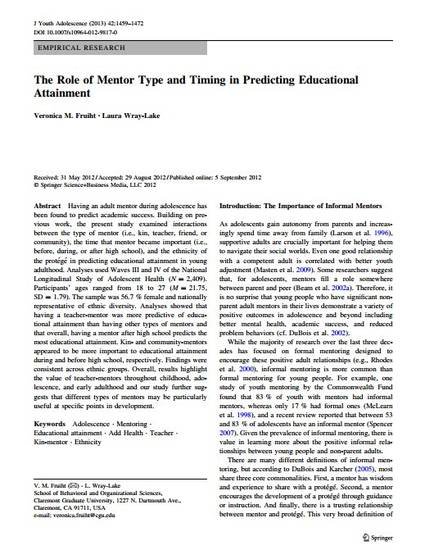
Article
The Role of Mentor Type and Timing in Predicting Educational Attainment.
Journal of Youth and Adolescence
(2013)
Abstract
Having an adult mentor during adolescence has been found to predict academic success. Building on previous work, the present study examined interactions between the type of mentor (i.e., kin, teacher, friend, or community), the time that mentor became important (i.e., before, during, or after high school), and the ethnicity of the protégé in predicting educational attainment in young adulthood. Analyses used Waves III and IV of the National Longitudinal Study of Adolescent Health (N = 2,409). Participants’ ages ranged from 18 to 27 (M = 21.75, SD = 1.79). The sample was 56.7 % female and nationally representative of ethnic diversity. Analyses showed that having a teacher-mentor was more predictive of educational attainment than having other types of mentors and that overall, having a mentor after high school predicts the most educational attainment. Kin- and community-mentors appeared to be more important to educational attainment during and before high school, respectively. Findings were consistent across ethnic groups. Overall, results highlight the value of teacher-mentors throughout childhood, adolescence, and early adulthood and our study further suggests that different types of mentors may be particularly useful at specific points in development.
Keywords
- Adolescence,
- Mentoring,
- Education attainment,
- Add Health,
- Teacher,
- Ethnicity
Disciplines
Publication Date
September, 2013
Citation Information
Veronica Fruiht and Laura Wray-Lake. "The Role of Mentor Type and Timing in Predicting Educational Attainment." Journal of Youth and Adolescence Vol. 42 Iss. 9 (2013) p. 1459 - 1472 ISSN: 0047-2891 Available at: http://works.bepress.com/veronica-fruiht/3/
